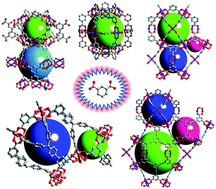Multifunctional metal–organic frameworks constructed from meta-benzenedicarboxylate units
Abstract
Metal–organic frameworks (MOFs), also known as porous coordination polymers (PCPs), are an emerging type of porous materials which are formed by the self-assembly of metallic centers and bridging organic linkers. Design and synthesis of organic linkers are very critical to target MOFs with desired structures and properties. In this review, we summarize and highlight the recent development of porous MOFs that are constructed from the multicarboxylate ligands containing m-benzenedicarboxylate moieties, and their promising applications in gas storage and separation, heterogeneous catalysis and luminescent sensing.

- This article is part of the themed collection: Metal Organic Frameworks (MOFs)

 Please wait while we load your content...
Please wait while we load your content...